
Generators and Transfer Switch Panels
Take a powerful and reliable power source with you and prepare your home or office for an inevitable power outage with an
electric generator.
According to the US Energy Information Administration (EIA), Americans experienced 20 more minutes of power failure in 2020 than in 2017. When
power is cut off, an electric backup generator will keep the lights on and keep you safe until power is restored. Power outages and blackouts are
caused by disastrous and unavoidable reasons such as thunderstorms, floods, hurricanes, tornados, snow storms, and poor infrastructure, which is why
you need to always be prepared for the worst. For a temporary power supply you can take anywhere, a portable generator can also be used during blackouts,
as well as at construction sites or remote locations. A standby generator, or home generator, is a permanently-placed machine that will ensure when the
power goes out, your home or office continues functioning.
Elliott Electric Supply offers both portable and standby machines, as well as switch panels for easy hookups. We provide reliable brands
such as Generac generators and Eaton generators.
Portable Generators
Due to their compact size and mobility, portable generators are great at providing temporary electrical power wherever it's needed. Portable,
small generators can provide reliable electrical power during outdoor activities or provide temporary power at construction sites due to their
compact size. They can also be used as a temporary source of power during a blackout. These gas-powered engines can provide temporary electricity to electrical appliances
connected to the generator through electrical extension cords.
As these generators are portable, they aren't permanently installed and are easy to move. Higher wattage in a portable generator means you can power more devices
or power an appliance that requires more watts.
Types of Portable Generators
Recoil Start Generators
Recoil Start Generators have a recoil cord you pull to start the combustion engine. Due to this simplicity, recoil starter generators are available
at a lower price than electric-start generators.
Electric-Start Generators
Electric-Start Generators use a push button or switch and an internal battery to start the engine, instead of a pull cord. Electric-start
generators are a great option for homeowners because they're easier to use and operate.
Shop Portable Generators
Standby Whole House Generators
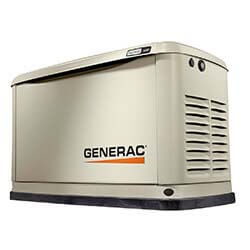
Power outages and blackouts can happen at any time and for multiple reasons such as thunderstorms, floods, hurricanes, tornados,
snow storms, and poor infrastructure. Having whole house generator, also known as standby generators, hardwired to your home or office means that when
disaster strikes, you can keeps your lights on. An emergency generator keeps electrical power systems up and running when normal power fails.
Types of Standby Whole House Generators
Air-Cooled Generators
Air-Cooled Generators are able to regulate their internal temperature by admitting cooler air and expelling hotter air that can cause overheating. Air-cooled
generators are a cost-saving option, but it's important to remember these generators are less effective in hot climates as the engine cannot cool itself with
hot air.
Shop Air-Cooled Generators
Standby Generators
Standby Generators operate using liquefied petroleum gas (LPG), or natural gas, which allows them to come in larger and more powerful sizes. Standby generators
have a fully automated operation so they require minimal maintenance. With a corrosion resistant, sound attenuated enclosure and an advanced alternator designed
for a clean electrical output, standby generators can be safely placed near a home or building.
Residential emergency home standby generators are permanently installed outside (similar to an air-conditioning unit), supply electrical power to all
pre-selected lights and appliances. Models range from 7,000 to 40,000 watts.
Shop Standby Generators
Generator Transfer Switch
A generator transfer switch, or switch panel, is used to connect a standby generator to a building. Similar to a
load center,
it contains circuits that monitor
electrical power so when a blackout occurs, it will automatically switch on your generator.
Types of Generator Transfer Switches
Generator Manual Transfer Switch
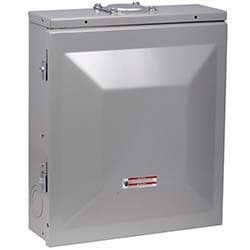
A Generator Manual Transfer Switch allows you to connect a portable generator to your home. These panels use mechanically interlocked breakers to
isolate selected critical circuits from the main panel and prevent paralleling of normal and emergency power. Manual transfer panels contain
breakers only. Generator panels include breakers, integral plug-in generator connection (power inlet), and dual wattmeters for load balancing.
Shop Manual Transfer Switches
Generator Automatic Transfer Switch
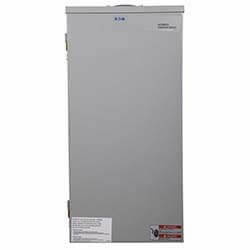
An Generator Automatic Transfer Switch is needed for any automatic standby generator to supply electricity to your home or office. The generator's
electrical panel is installed near the building's main circuit breaker where it can monitor the flow of electricity. When this panel senses a total
power outage, the standby generator is automatically switched on to supply electricity to the building
Shop Automatic Transfer Switches
Energy Efficient Automatic Transfer Switch
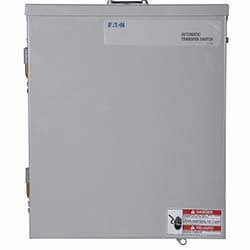
For an energy efficient option, a "Green" Automatic Transfer Switch offers a power-saver control and whole house surge protection for any generator.
This switch is the most advanced active-load management system and allows you to get the most out of your generator. In addition, the green automatic
switch actively manages the two largest loads and will prevent the generator from being overloaded while allowing other circuits to function without
issue.
Shop Energy Efficient Transfer Switches
To install a switch panel onto your home, a professional electrician is needed to not only safely rewire your house but to also ensure you're new electrical
panel follows all local, state, and national electrical codes.
Generator Efficiency
In an ideal world, all the gas energy that your generator uses would be converted directly into usable, electric energy. Unfortunately, generators have both
usable electric energy called true power (kW) and energy that is not useable called reactive power (VAR). The total combined power is called
apparent power (kVA).
The ratio of the useable power to the total power is the power factor (PF), which tells us the efficiency of the generator. To calculate the power factor,
use the following formula: PF = kW / kVA
Power Factors range from 1 to 0, where 1 is the most efficient. Power Factors under 0.8 are considered low. To optimize the energy efficiency of your generator,
consult an electrician about adjusting the load on your generator.
It is important to consider power and ratings when evaluating generators. Once you've determined how much power you need, you will better be able to determine
the generator type.
What Size Generator Do I Need?
The size of generator depends on its power output and fuel tank size. Generators that produce a high wattage area capable of powering more electrical devices
and generators with large fuel tanks can operate longer.
Generator Sizing Guides:
History of Generators
Created in 1831 by Michael Faraday, an electric generator uses wire and magnets to create mechanical energy that gets converted into electrical energy so you can power
your electric devices. The most common types currently are portable generators and standby whole home generators, typically powered by propane, natural gas, or diesel fuel.
Despite the implications of the name, a generator actually doesn't create electricity; rather, it takes another form of energy and converts it into electricity.
Generator Safety
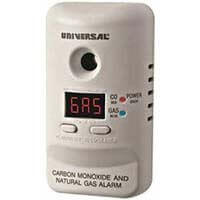
When buying a home generator, you must consider human safety during operation. Generators running on gasoline and diesel produce dangerous exhaust
emissions including carbon monoxide (CO), which, in high doses, can result in carbon monoxide poisoning and even death. NEVER operate a generator
in an enclosed space such as a home, garage and utility shed without CO detector on hand! Additionally, fire and electrocution can occur if a generator
is not handled properly. Read more at Construction, Fire, and Safety Coalition, which discusses generator safety and how to enable best results.
Shop Carbon Monoxide Detectors
Furthermore, a type of fuel close by doesn't mean it's the best to buy for your generator. Stability is an important factor in fueling. Make sure
to choose a generator that runs on the most stable fuel available in your area. This will ensure your generator not only runs better, but also provide
you some ease of mind.
Keep Your Power On
You may find yourself wondering, why buy a generator? The answer is simple: To keep your power on, always!
One way to ensure your electricity remains in your hands and not the weather's is to invest in a home generator. Hopefully this guide has provided you with
essential information to purchase your next generator at ElliottElectric.com.
With locations across multiple states, Elliott Electric Supply understands the electrical industry and your needs, unlike
big-box retailers and e-commerce corporations. Now, you can access our supplies and services more conveniently using our mobile-friendly website and through our
customer app. With a number of premier
emergency generator options available for homeowners, institutions and businesses/industries, we offer wholesale pricing and premier customer service.
From arrestors to junction boxes to electric power generator options, we've got your electrical needs covered. With great pricing, extensive inventory, and fast
delivery, you'll find no better wholesale electrical supplies distributor online than Elliott Electric Supply.
Learn More About Generators:
Learn More About Our Other Products:
Warning: When using this information to perform electrical work, call a licensed electrician or consult the NEC® for safety. All
licensed electricians have passed examinations covering the National Electric Code®, know state and local building codes, and may carry insurance to cover damages.